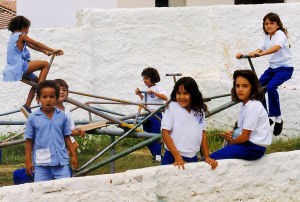Child Sponsorship Background from Caicó, Brazil
 SOS Children's Village Rio Grande do Norte
SOS Children's Village Rio Grande do Norte
The SOS Children's Village
was built in a large residential area on the outskirts of Caicó. It is
very well integrated into its surroundings. SOS Children's Village Rio
Grande do Norte opened its doors in June 1978 and is home to well over 150 children. There is also the
village director's house, a house for the so-called SOS aunts (SOS
mother trainees or family helpers who support the SOS
mothers during their daily work and fill in for them when they are
ill or on leave), a multi-purpose hall for functions and festivities,
and an administration and service area.
Other SOS Projects in Rio Grande do Norte
The adjoining SOS School provides primary education to hundreds of pupils, both from the SOS Children's Village and from the local community.
In 2002, an SOS Youth Home was set up in the province capital of Natal, which is a few hundred miles from Caicó. It accommodates young people from the Village who as they approach adult life.
Young people usually move from the SOS Children's Village to an SOS Youth Home when they start a vocational training course or go on to higher education. With the support of qualified youth workers, the young people develop realistic perspectives for their future, learn to shoulder responsibility and increasingly make their own decisions. They are encouraged to develop team spirit and build up contacts with relatives and friends, as well as with the relevant authorities and potential employers.
Background to Caicó
Caicó, north-east Brazil, has a population of approximately 60,000. It is a municipality located in Rio Grande do Norte, Brazil and is the seat of the Roman Catholic Diocese of Caicó. The city regularly suffers from droughts, which leads to poor consequences for the local economy, especially as agriculture is a big contributor.

 Return to Schools Wikipedia Home page…
Return to Schools Wikipedia Home page…
